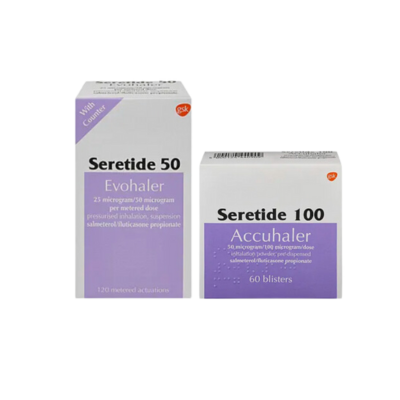Seretide
Category:AsthmaSeretide is a brand of inhaler medication used to manage asthma and chronic obstructive pulmonary disease (COPD). It contains two active ingredients: fluticasone propionate (a corticosteroid) and salmeterol (a long-acting beta-agonist).
Requires Prior Diagnosis By GP for Approval
Fetching Data...
Frequently Asked Questions for Seretide
How Seretide Works: Seretide works by combining the anti-inflammatory effects of fluticasone with the bronchodilating effects of salmeterol. Fluticasone reduces inflammation in the airways, while salmeterol relaxes the muscles around the airways, making breathing easier.
Types of Seretide Inhalers:
-
Seretide Evohaler: This is a pressurized metered-dose inhaler (pMDI) that delivers a specific dose of medication with each inhalation.
-
Seretide Accuhaler: This is a dry powder inhaler that requires the user to inhale forcefully to release the medication in powdered form.
Usage and Benefits: Seretide is used regularly, usually twice a day, to provide long-term control of asthma or COPD symptoms. Benefits of Seretide include:
-
Improved Lung Function: The combination of fluticasone and salmeterol helps open up airways, leading to better lung function and reduced symptoms.
-
Prevention of Asthma Attacks: Regular use can help prevent asthma exacerbations and COPD flare-ups.
Side Effects: Common side effects of Seretide may include:
- Throat irritation
- Hoarseness
- Candida (yeast) infection in the mouth and throat (thrush)
- Headache
- Tremor
Seretide contains a long-acting beta-agonist, which may increase the risk of severe asthma-related events.
Contraindications: Seretide may not be suitable for everyone. Contraindications include:
- Allergy to fluticasone, salmeterol, or any other ingredients
- Uncontrolled asthma or severe COPD
- Active fungal, bacterial, or viral infections
Signs and Symptoms: If you experience any of the following signs or symptoms while using Seretide, seek medical attention:
- Worsening breathing problems
- Rapid heartbeat
- Increased blood pressure
- Chest pain
References: For comprehensive and specific information about Seretide, consult reliable medical sources such as:
- Seretide Patient Information Leaflet.
- National Institute for Health and Care Excellence (NICE) Asthma Guidelines.
- Global Initiative for Asthma (GINA) Guidelines.
Please consult a healthcare provider for personalized advice, contraindications, and guidance tailored to your individual health needs and medical history. This overview is intended for general knowledge and should not replace professional medical guidance.
